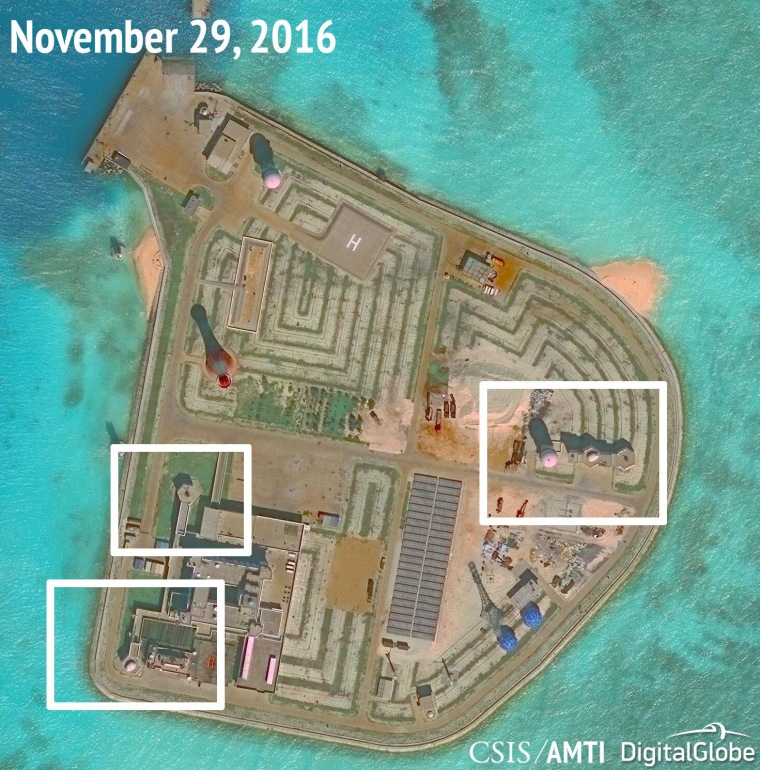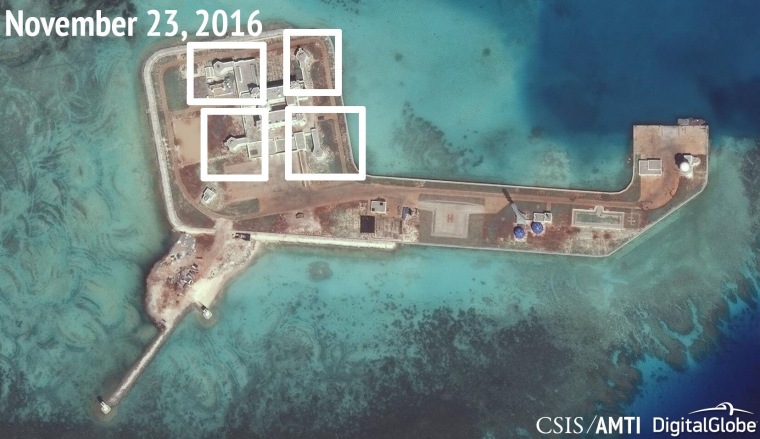BEIJING — A U.S. think tank says recent satellite images appear to show that China has installed anti-aircraft and anti-missile weapons on its man-made islands in the strategically vital South China Sea, upping the stakes in what many see as a potential Asian powder keg.

The Center for Strategic and International Studies said in a report late Wednesday that the anti-aircraft guns and close-in weapons systems designed to guard against missile attack have been placed on all seven of China's newly created islands.
The outposts were built in recent years by piling sand on top of coral reefs followed by the construction of military grade 10,000-foot airstrips, barracks, lighthouses radar stations and other infrastructure.
CSIS based its conclusions on satellite images taken of the islands in mid-to-late November and published on the website of its Asia Maritime Transparency Initiative, which has been tracking construction of hexagonal structures on Fiery Cross, Mischief and Subi reefs in the Spratly Islands since June and July.
"If someone makes a show of force at your front door, would you not ready your slingshot?"
China's new island armaments "show that Beijing is serious about defense of its artificial islands in case of an armed contingency in the South China Sea," CSIS experts wrote in the report.
"Among other things, they would be the last line of defense against cruise missiles launched by the United States or others against these soon-to-be-operational air bases," the report said.
Images from Fiery Cross Reef showed towers that likely contained targeting radar, it added.
China's Defense Ministry said in a statement on its microblog on Thursday that it was "legitimate and lawful" for it to place defensive military installations on islands where it said Beijing had "indisputable sovereignty."
"If someone makes a show of force at your front door, would you not ready your slingshot?" it said.

Chinese Foreign Ministry spokesman Geng Shuang told a regular news briefing in Beijing that he "did not understand" the situation referred to in the report.
Beijing says the manufactured islands are intended to boost maritime safety in the region while downplaying their military utility. They also mark China's claim to ownership of practically the entire South China Sea, its islands, reefs and other maritime features.
Taiwan, Vietnam, the Philippines, Malaysia and Brunei also claim territory in the waterway through which an estimated $5 trillion in global trade passes each year, while the U.S. Navy insists on its right to operate throughout the area, including in waters close to China's new outposts. China has strongly criticized such missions, formally termed Freedom of Navigation Operations.
The U.S. has committed to beefing up its military presence in the area, although new uncertainty has been introduced by incoming president Donald Trump who broke long-established diplomatic protocol by talking on the phone earlier this month with the president of China's longtime rival Taiwan.
Related: China Expresses 'Serious Concern' Over Trump Threat
Trump has called for a reconsideration of its commitments to its Asian allies, including Japan and South Korea, while simultaneously criticizing Chinese trade policy toward the U.S. along with its new territorial assertiveness.
Trump referred to China's man-made islands in a tweet earlier this month, saying Beijing didn't ask the U.S. if it was OK to "build a massive military complex in the South China Sea."
"The timing is significant in that these first clear images come amid Trump's challenging comments about China and its South China Sea fortresses," said Alexander Neill, a senior fellow for Asia-Pacific security for the International Institute for Strategic Studies based in Singapore.
Wang Xiaopeng, a Chinese analyst on South China Seas affairs, alleged that it was "the U.S. that is militarizing the South China Sea."
Speaking to NBC News, Wang added: "The situation in the South China Seas is basically stable. China and the nearby nations are meeting halfway in most cases and are willing to ease the possible tension. But big nations outside this region, like the U.S. who plays as a leader, are disturbing the status quo."
In all, China has reclaimed more than 3,200 acres of land in the southeastern South China Sea. The U.S. says the building doesn't give China any additional territorial rights and an international arbitration panel in the Hague ruled over the summer against China's historical claim to ownership of waters within the South China Sea. Beijing has ignored the ruling.
China has sought to emphasize the usefulness of the island developments for civilian navigation in the area, while also asserting its right to equip them with whatever means deemed necessary for their defense. Chinese President Xi Jinping said on a visit to the U.S. last year that "China does not intend to pursue militarization" of the area, prompting some foreign experts to accuse China of going back on its word with its new deployments.